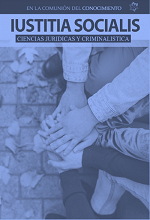Penalties for parents of adolescents who commit sexting offences on social media in Ecuador
DOI:
https://doi.org/10.35381/racji.v5i3.1082Keywords:
Parent-child relationship, sexual behavior, social networks.Abstract
The research is focused on the review of a social problem that is of knowledge and interest of society and affects boys, girls and adolescents between 10 and 14 years old, such as the publication of sexual content of nudity or semi-nudity on social networks better defined as sexting. The main objective of this work is to analyze the norms and legal bases corresponding to the sanctions for the parents of adolescents regarding crimes. A quantitative study, descriptive type and bibliographic documentary analysis, statistical compilation was carried out through a survey. Once the data had been collected, the analytical-synthetic method was used. It is concluded that the lack of definition of the sexting crime within the comprehensive organic criminal code and of responsibility for the parents of children and adolescents in these crimes, it is proposed that parents take greater care in the use of networks.
Downloads
References
Acedo-Penco, A. & Platero-Alcón, A. (2016). La privacidad de los niños y adolescentes en las redes sociales: Referencia especial al régimen normativo europeo y español, con algunas consideraciones sobre el chileno. [The Privacy of Children and Adolescents in Social Networks: Special Reference to the European and Spanish Regulatory Regime, with some Considerations on the Chilean]. Revista Chilena de Dercho y Tecnologia.5(2),63-94 http://dx.doi.org/10.5354/0719-2584.2016.42557
Asamblea Nacional Constituyente de la República del Ecuador, (2008). Constitución de la República del Ecuador. [Montecristi. Registro Oficial 449 de 20-oct-2008. Recuperado de https://n9.cl/sia
Asamblea Nacional, COIP. (2014). Código Orgánico Integral Penal. [Comprehensive Criminal Organic Code] Quito.
Córdova-Cárdenas, R., Narváez-Zurita, C., Erazo-Álvarez, J. & Vázquez-Calle, J. (2020). Responsabilidad tuitiva de padres en la educación sexual de sus hijos versus el salvador externo [Tuitive responsibility of parents in the sexual education of their children versus the external savior]. Iustitia Socialis. Revista Arbitrada de Ciencias Jurídicas.5(2),349-376 http://dx.doi.org/10.35381/racji.v5i2.748
Fajardo-Caldera, Ma I., Gordillo-Hernandez, M., & Regaldo-Cuenca, A., (2013). Sexting: Nuevos usos de la tecnología y la sexualidad en adolescentes. [Sexting: New uses of technology and sexuality in adolescents]. Revista International Journal of Developmental and Educational Psychology.1(1), 521-533. Recuperado en: https://n9.cl/ynv2
Instituto Nacional de Estadísticas y Censos (INEC), “Encuesta Nacional de población y vivienda 2010-2012,” [National Population and Housing Survey 2010-2012] ecuadorencicfras, Quito, 2016. https://n9.cl/rzq5f
Jara-Obregón, L., Ferruzola-Gómez, E., & Rodríguez López, G. (2017). Delitos a través redes sociales en el Ecuador: una aproximación a su estudio. [Crimes through social networking sites in Ecuador: an approach to their study]. Revista I+D Tecnológico, 13(2),112-121. Recuperado https://n9.cl/rzq5f
Mejias-Soto, G. (2014). Sexting: una modalidad cada vez más extendida de violencia sexual entre jóvenes. [Sexting: an increasingly widespread form of sexual violence among young people]. Revista Perinatología y reporducción humana.28(4),217-221. Recuperado en: https://n9.cl/m59qr
Secretaria General de la Organización de los Estados Americanos. (20018). Informe Regional. Lineamientos para el empoderamiento y la protección de los derechos de los niños, niñas y adolescentes en internet en Centroamérica y República Dominicana. [Regional Report. Guidelines for the Empowerment and Protection of the Rights of Children and Adolescents on the Internet in Central America and the Dominican Republic]. Recuperado en: http://www.ecpat.org
Scheechler, C. (2019). Aspectos fenomenológicos y políticos-criminales del sexting. Aproximación a su tratamiento a la luz del Código Penal chileno. [Phenomenological and criminal policy aspects of sexting. An approach to its treatment under the Chilean Criminal Code]. Polit.crim.14(27),376-418. Recuperado de: https://n9.cl/df9x6
Published
How to Cite
Issue
Section
License
CC BY-NC-SA : Esta licencia permite a los reutilizadores distribuir, remezclar, adaptar y construir sobre el material en cualquier medio o formato solo con fines no comerciales, y solo siempre y cuando se dé la atribución al creador. Si remezcla, adapta o construye sobre el material, debe licenciar el material modificado bajo términos idénticos.
OAI-PMH URL: https://fundacionkoinonia.com.ve/ojs/index.php/Iustitia_Socialis/oai










